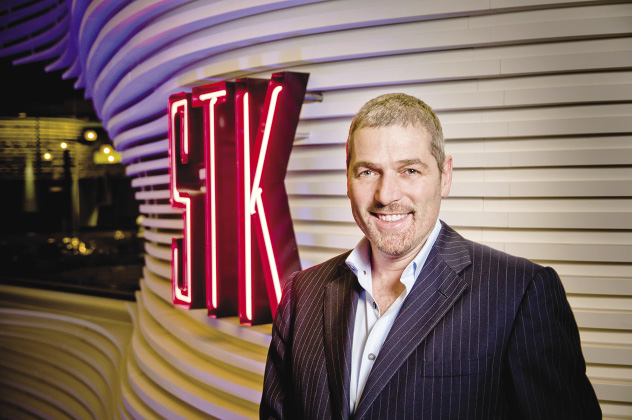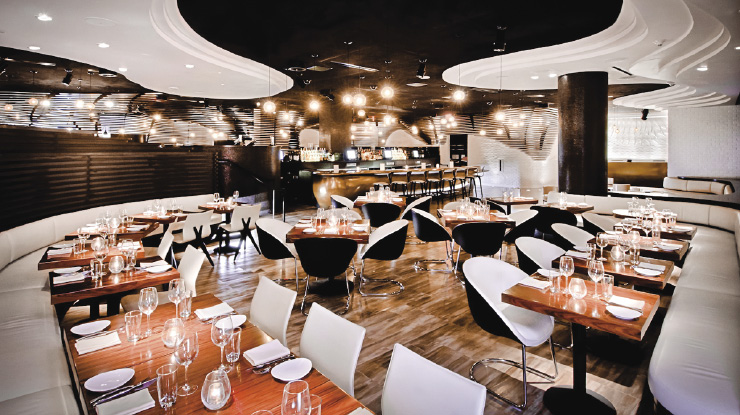


![]()
ONLINE


Jonathan Segal
ONExperience
Editors’ Note
Jonathan Segal has over 35 years of experience working for family owned hospitality companies, including The Modern Group. With his father, he created The International Travel Group in 1991, a successful merger of two hotel booking companies, Expotel Hotel Reservations and Room Center. In addition, he was also the Co-Creator of WorldPay, the world’s first Internet payment company and the predecessor to PayPal.
Company Brief
The vision of The ONE Group (www.togrp.com) is to create a global hospitality company that develops and operates luxury restaurants, lounges, nightclubs, and turnkey food and beverage operations for venues, casinos, and boutique hotel groups. Founded in 2001, the company currently operates a number of brands including STK, Asellina, Cucina Asellina, and Heliot, and partners in nightclub Tenjune and French bistro Bagatelle. The company operates venues in New York, Miami, Los Angeles, Las Vegas, Atlanta, Washington, D.C., and London.
Why was it important to go public at this stage?
There were two principal reasons why we looked to go public: First, to give us additional credibility and, second, to enable us to open the door to a new form of capital to help us to execute our business plan.
We started to expand the company in 2006 when revenues were $6.5 million and, despite the fact that for half of the company’s life the economy has been in recession, we have been successful in growing revenues to approximately $125 million in 2013.
Becoming a public company immediately gave us the opportunity to access capital, which has given us the resources we need to execute on our business plan and grow our business by being proactive, when opportunities arise, rather than being reactive to them.

STK Las Vegas
How were you able to grow so fast in this challenging environment?
Due to the lack of capital in our early days, we brought investors in at the subsidiary level, so we’d sell a point here and there to different investors in order to raise the capital to do the original restaurants.
After that, it became a function of reinvesting the cash flows and using the company’s own cash resources to build the business.
This made for slower growth, and it limited the number of opportunities we could open because we were utilizing our own capital. We did it even without a bank line of credit – it wasn’t until November 2011 when the company was doing $80 million in revenue that we were able to get a line of credit for just $3 million.
Is STK the anchor brand or do you anticipate growth for all your brands?
Today, we’re focused on STK and our hospitality program, and we have a number of other brands and restaurants that we operate, but they’re mostly operated within hospitality deals. STK is to some degree an anchor. A lot of people will contact us because they’d like to have an STK at their property or hotel and, if it works, that’s great; if not, we’ll still be involved with the potential venue, but it’s more likely we’ll create a brand or restaurant operating uniquely for them.
The actual number of operations and names/restaurants we have is always increasing, but our main focal brands are STK and the hospitality program, which we call ONExperience™, where we go into these venues and take over their entire food and beverage program.
Are there certain characteristics that are consistent throughout your venues?
The market we trade in is four-star and four-star deluxe. Furthermore, we gravitate towards hotels and venues that are sexy, cool, and trendy, maybe slightly vibe-driven; people that are looking for more from the experience than just a great meal – they want a great night out with good music, a hot bar scene with stylish cocktails, and a great vibe and energy.
What is the STK secret?
First, we try to create venues that have female sensibilities. Second is our targeted age demographic – the average age of an STK guest is a guy in his mid- to late-30s and a girl in her mid- to late-20s. We’re catering to a market for people who want to enjoy a night out, but at the end of their dinner, they don’t necessarily want to go home.
Catering with a high degree of excellence to that market has helped us retain our momentum.
The best example of the sustainability of our venues is that in 2013, in Open Table’s Top 100 Hottest Restaurants in America, four of them were STKs, including some of our earliest ones.
Is there an effective understanding of the quality of your food product?
Even if you have a great overall experience, with average food people won’t come back. We don’t use our food as our main selling point because the consumer expects and deserves a great quality meal with great service. Given that’s the starting point, it enables us to focus on the other parts of the experience, which are the cocktail menu, the music, the vibe, the bar scene, and the interaction between the server and guest.
What do you look for when hiring talent?
The single most important factor is enthusiasm. If our staff are enthusiastic, it will improve the overall guest experience.
We have a fairly extensive training program and we want them to learn the manuals but, at the end of the day, we want their personalities to come out.
Do you enjoy managing or are you always thinking of future opportunities?
It is a combination of both. I need to sustain successful management, as well as look at ways to drive the business forward. I have always tried to bring people on board who can successfully manage the company alongside me. I think the biggest challenge is to identify the people who have the ability to help us execute on our strategy.
You have to be careful to encourage management to retain their enthusiasm to participate and contribute, while not deflating them given there is only so much you may want to change on a successful concept.
It’s important to find people who embrace our culture and also bring in improved or more creative operating procedures that we can adapt without damaging the culture.
We’re always looking to enhance the guest experience while protecting the strengths that have made STK what it is today.
Do you also have a focus on international markets or is it strictly U.S.?
There are about 50 cities across the world we have targeted for STKs and, in every city in which we put an STK, we can, for the most part, do hospitality deals.
We recently opened in London and STK London has proven a huge success, which has encouraged us to move forward with our international expansion.
America will probably hold about 15 STKs in total and the balance will be located internationally; and the hospitality deals can be rolled out either independently in cities or alongside those STKs.•